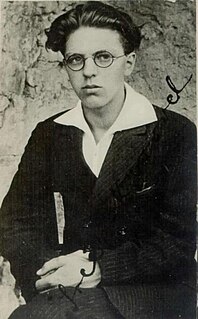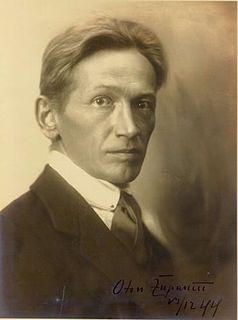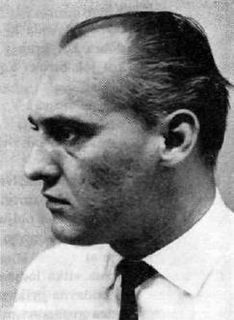Related Research Articles

Slovenia, officially the Republic of Slovenia, is a country located in Europe at the crossroads of main European cultural and trade routes. It is bordered by Italy to the west, Austria to the north, Hungary to the northeast, Croatia to the southeast, and the Adriatic Sea to the southwest. Slovenia covers 20,273 square kilometers (7,827 sq mi) and has a population of 2.084 million. One of the successor states of the former Yugoslavia, Slovenia is now a parliamentary republic and member nation of the European Union, United Nations, and NATO. The capital and largest city is Ljubljana.

The Freising manuscripts are the first Latin-script continuous text in a Slavic language and "the oldest document in Slovene".

Novo Mesto is the city on a bend of the Krka River in the City Municipality of Novo Mesto in southeastern Slovenia, close to the border with Croatia. The town is traditionally considered the economic and cultural centre of the historical Lower Carniola region.
Slovene literature is the literature written in the Slovene language. It spans across all literary genres with historically the Slovene historical fiction as the most widespread Slovene fiction genre. The Romantic 19th-century epic poetry written by the leading name of the Slovene literary canon, France Prešeren, inspired virtually all subsequent Slovene literature.

Srečko Kosovel was a Slovenian poet, now considered one of central Europe's major modernist poets. He was labeled an impressionistic poet of his native Karst region, a political poet resisting forced Italianization of the Slovene areas annexed by Italy, an expressionist, a dadaist, a satirist, and as a voice of international socialism, using avant-garde constructivist forms. He is now considered a Slovenian poetic icon.

Oton Župančič was a Slovene poet, translator and playwright. He is regarded, alongside Ivan Cankar, Dragotin Kette and Josip Murn, as the beginner of modernism in Slovene literature. In the period following World War I, Župančič was frequently regarded as the greatest Slovenian poet after Prešeren, but in the last forty years his influence has been declining and his poetry has lost much of its initial appeal.
Among the modes of expression of the culture of Slovenia, a nation state in Central Europe, are music and dance, literature, visual arts, film and theatre. A number of festivals take place, showcasing music and literature.

Veno Taufer is a Slovenian poet, essayist, translator and playwright. Under the Communist regime, he was a driving force behind alternative cultural and intellectual projects in Socialist Slovenia, which challenged the cultural policies of the Titoist system. During the Slovenian Spring (1988–1990), he actively participated in the efforts for the democratization and independence of Slovenia.

Tone Pavček was one of the most influential Slovene poets, translators, and essayists from the first post-war generation. He published numerous collections of poetry, well received by readers and critics alike. He also translated a number of Russian works into Slovene.

Miroslav Košuta is a Slovene poet, playwright and translator from Križ by Trieste, a younger representative of Intimism and Socialist Realism. On 7 February 2011, he received the Prešeren Award, the highest cultural award in Slovenia, for his poetry and contributions to the preservation of the Slovene language in Italy.

Milan Dekleva is a Slovene poet, writer, playwright, composer and journalist.

Kajetan Kovič was a Slovene poet, writer, translator, and journalist.

Ciril Zlobec was a Slovene poet, writer, translator, journalist and former politician. He is best remembered for his poems, publishing several volumes of poetry in his lifetime. In 1990 he became a member of the Presidency of Slovenia at a critical time for Slovene independence.

Milan Jesih is a Slovene poet, playwright and translator. He was the president of the Slovene Writers' Association between 2009 and 2011.
Andrej Medved is a Slovene poet, editor and translator. He has published numerous poetry collections.
Uroš Zupan is a Slovene poet and translator. He has published numerous collections of poetry and his poetry has also been translated into German, Polish, Czech, English, Serbian and Croatian.
Alojz Ihan is a doctor, specialist in medical microbiology and immunology from Slovenia. Beside his medical profession he is also an acclaimed poet, writer, essayist and editor.
The Veronika Award is a literary award in Slovenia awarded each year for the best Slovene poetry collection of the year. It has been bestowed since 1997 by the Municipality of Celje at the Veronika Festival that takes place at Celje Castle. The festival and the award are named after Veronika of Desenice, wife of Frederick II, Count of Celje, accused of witchcraft, incarcerated in Ojstrica Castle and murdered in around 1425. The winner receives a financial award. Since 2005 a separate Poetry Gold Medal is bestowed on a poet for their life achievement that has contributed to the richness of Slovene poetry, language and culture.

Ivan Minatti was a Slovene poet, translator, and editor. He started writing poetry before World War II, but principally belongs to the first postwar generation of Slovene poets. He is one of the best representatives of Slovene Intimism.
Ada Škerl was a Slovene poet, writer and translator from French.
References
- ↑ Pavlič, Darja (May 2008). "Contextualizing contemporary Slovenian lyric poetry within literary history" (DOC). Retrieved 7 February 2011.
- ↑ (in Slovene) http://gradivo.e-univerza.net/slo/Obdobja/sodobna_slovenska.htm Archived 2011-07-23 at the Wayback Machine
- ↑ "Umrla Ada Škerl" [Ada Škerl Deceased]. Delo.si (in Slovenian). 1 June 2009. Retrieved 7 February 2011.
| This poetry-related article is a stub. You can help Wikipedia by expanding it. |